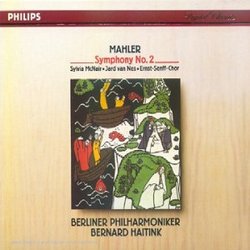| All Artists: Mahler, Haitink, Berlin Philharmonic Title: Symphony No. 2 "Resurrection" Members Wishing: 0 Total Copies: 1 Label: Polygram Records Original Release Date: 1/1/1994 Re-Release Date: 7/19/1994 Genre: Classical Style: Symphonies Number of Discs: 2 SwapaCD Credits: 2 UPC: 028943893527 |
Search - Mahler, Haitink, Berlin Philharmonic :: Symphony No. 2 "Resurrection"
CD Details |
CD ReviewsMusic first. Arnout Koeneman | the netherlands | 09/01/2003 (5 out of 5 stars) "I've read some reviews about Haitinks performances with the Berliner Philharmoniker and they're all pointed at one direction: the playing is cold.
I cannot disagree more. I don't believe in an orchestra that is especially suited to Mahlers work (although perhaps the concertgebouw orchestra has the right 'warmth', different than any other orchestra) and the negative comments I often read about the Berliner are simply not fair. Perhaps many people associate the Berliner still with Von Karajan and the few recordings he made that were a bit too kitsch. The playing on this record is beautiful, delicate at times and extremely powerful when needed (Haitink being restrained is a misconception) Tempi are well jugded. Some however might think the playing is too perfect. There seems to be this general idea about expression in music: when it is beautifully played it always lacks some spirit or character, but when not it's ok. I think that's not fair, it also depends on the recording: old recordings are more direct in sound than many newer and can often suggest that the playing is more expressive than it really is. Let me say that this symphony gets the right articulation and phrasing. I like it much better than the much praised Klemperer studio recording when it comes to tension - Haitink is under the skin-like - and articulate playing. Haitink keeps the right tension by not over-exaggerate some tuttis and keeping the music flowing without extensive rubato and tempi fluctuations, nor does he hurry, speed up the music in extremes, phrases are able to breath. Like Boulez his conducting puts the music first with a natural flow. Other conducters think that the music needs some extra guidance and you often can hear the conductor making a decision while playing the music (Rattle, Bernstein and Abbado) wich takes me immediately out of the music and looking straight in the conducters face. Maybe I'm cold hearted and do I like sound, natural flow and color better than human intervention, but classical music often moves me more when I don't get interupted by the conducters ideas or emotions. This is not without saying that the recording lacks some humanity, but its humanity is not thrown in your face, you can only feel it, It sound so natural that you can hardly call it an interpretation. I mentioned Boulez earlier on and I think Boulez would have chosen faster tempi in this symphony but with the same natural phrasing Haitink has. Bernstein is way too slow and slow doesn't mean deeper as one might think, it is rather like the word's exact meaning: slow, I can't bear that and the so called tension in Bernsteins performances puts me to sleep. Rattle likes to put some emphasized accents and likes big contrasts, its a fair way of interpret this symphony, but you can hear it too much: you listen to an interpretation rather than the music itself. The reason why some people might think this reading is cold may because of the rather cool recording. Volker Strauss is not my favorite producer, the sound is a bit artificial and not much organic. You can hear every detail, that's fine, but Boulez recordings for instance are very detailed as well but with much more warmth. Nonetheless a good recording. I forget to mention that the singing is great too (Jard van Nes, Sylvia McNair!! and the Ernst-Senff-Choir). Judge for yourself when listening to this recording, although my timing couldn't be worse: this album is out of stock!" |


![header=[] body=[This CD is available to be requested as disc only.]](/images/attributes/disc.png?v=a4e11020)
![header=[] body=[This CD is available to be requested with the disc and back insert.]](/images/attributes/disc_back.png?v=a4e11020)
![header=[] body=[This CD is available to be requested with the disc and front insert.]](/images/attributes/disc_front.png?v=a4e11020)
![header=[] body=[This CD is available to be requested with the disc, front and back inserts.]](/images/attributes/disc_front_back.png?v=a4e11020)